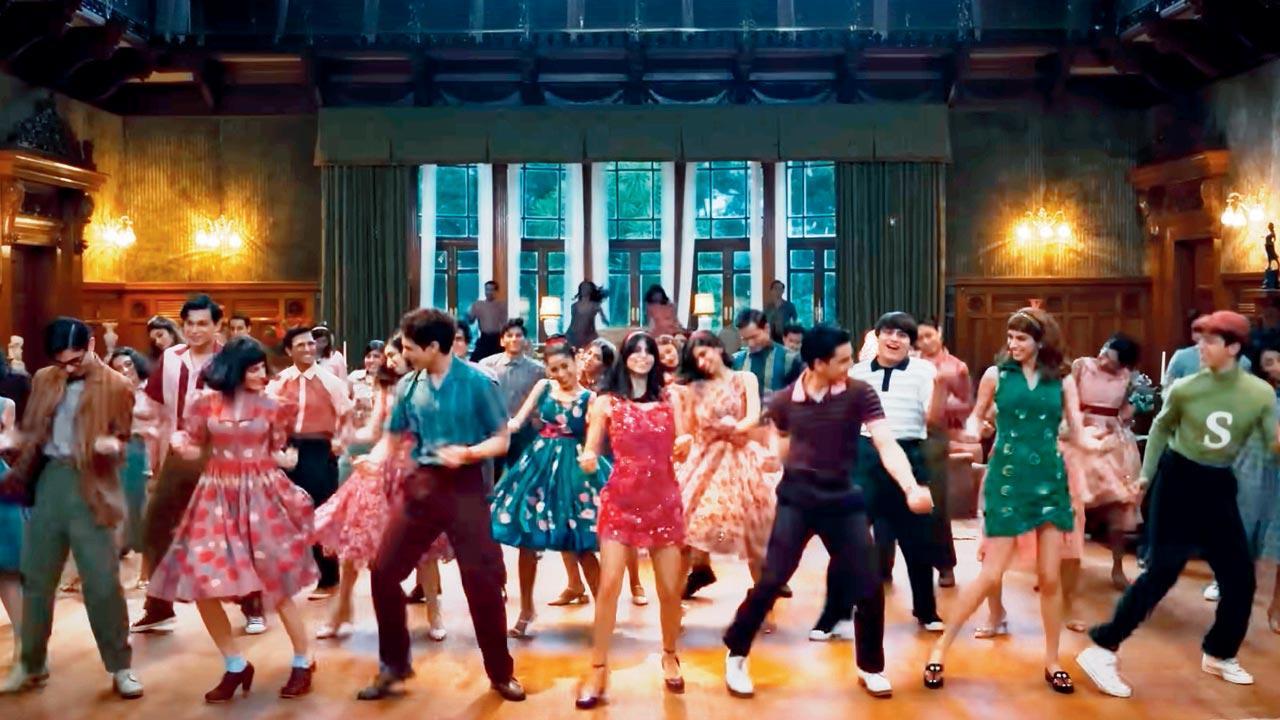Before Riverdale, there was McCluskieganj, Kharagpore and countless other charming, real-life Anglo Indian settlements that were part of the demographic in pre and post-colonial India. Here is an ode to those wonder years, with some help from a long-gone family member

The gang in The Archies grooves to Wooly Bully. Pic Courtesy/Youtube
 Today is Christmas Day, or Burra Din, as we Anglos sometimes refer to it while speaking in our broken ‘Hindee’. Enough reason for this columnist to slip into fantastical mode, wondering how her Maxine nana (grandmother, for the uninitiated) would have reacted if she watched Zoya Akhtar’s The Archies. Here is her imagined letter to the director and her team.
Today is Christmas Day, or Burra Din, as we Anglos sometimes refer to it while speaking in our broken ‘Hindee’. Enough reason for this columnist to slip into fantastical mode, wondering how her Maxine nana (grandmother, for the uninitiated) would have reacted if she watched Zoya Akhtar’s The Archies. Here is her imagined letter to the director and her team.
My dear Zoya girl,
First of all, heartiest congratulations to you and your team for showcasing my people in a good light after decades. I thank the Lord that I could live to see this day before I kicked the bucket.
Never in my wildest dreams did I imagine that the same comic books, which my granddaughter, Fiona, would pore over during her summer holiday breaks with us, would bring the community back into public imagination. It is a relief, honestly, to see us portrayed not as riff-raffs, like those characters in the Hindee films, where we are either drunkards, scheming vamps, frivolous bar dancers, or lapra/gunda-type boys. Those movies caused “ek dum doka” to the community. Because of this popular built-up perception, all of us were painted with the same brush. I suspect St Anthony might have worked a miracle to cause this positive turn.
Credit to you for sourcing mostly accurate information when it came to characterising our micro community that has unfortunately scattered in all directions over time. You’ve managed to paint a pretty, picture-perfect panorama. Dare I say, a tad too pretty. My dear husband, Jacob—God bless his soul —would agree with what I am about to say. The youngsters look like pucca missy mems and the mama-ko-pucho babalog from my youthful days. I teared up when I spotted that Cooper girl’s outfits. The memories came racing back —of begging the darzee baiyya to replicate patterns from foreign magazines that showcased the best of Hollywood’s fashions!
Your film—and I hope I am right—may have reminded people that we were once a large community in India. We are a peaceful and well-educated bunch; we swear by our ball curry and OT [I missed seeing our burra khana in the film]; we sing and dance; we work hard just as much as we believe in the ‘Que Sera, Sera’ way of life. Most importantly, we possess a strong sense of community. Today, our numbers have dwindled, which is why I suspect that our existence and our contributions are no longer in the public domain. Unlike what is portrayed in your film, the 1960s was a challenging time for AIs in India with real issues [beyond saving a green park and development]. We were grappling with our identity in a country that was transitioning really fast. Many migrated to foreign lands, to seek better opportunities or join their families who had moved there, post 1947. We also began to feel, dare I say, side-lined after more people picked up the English language, which is our ‘mother tongue’. Thus, we were no longer sought after, especially in the fields of education, railways and hospitality.
But I gather that this wasn’t meant to be a historic documentary; you have interpreted our lives using what film people call, “creative liberties”. If that wasn’t the intent, forgive me for overstepping my boundaries as a senior AI from another era.
However, if you would still like to know about the real deal, a trip to McCluskieganj would be perfect. Long-time residents are bound to reminisce about the glory days of big Christmas balls and bigger culinary spreads that reflected the traditions of community bonding. Or you could head to former railway towns like Kharagpore that were lined with quaint bungalows belonging to engine drivers, ticket collectors and linesmen, who would have regaled you seated in their verandahs, with stories while being “on line”. Got you there, didn’t I? ‘On line’ is the term used for all railway folk who worked on a moving train. These last-surviving towns are filled with delightful storytellers. You can thank me later.
My favourite part was reliving that trippy number, Wooly Bully by Sam The Sham and The Pharaohs. It took me back to those doom-darm parties when we would sneak out from the windows, after our parents fell asleep. The dance floor would be filled with chappies looking like Anglo Presleys. Have you heard about them? Elvis Presley-style imitators among AIs were given this tag—they had slicked-back hair, thick sideburns, wore thin leather belts and moved with a swagger like the superstar. Hank was my favourite; he jived like a dream…Bobbery-Bob!
’Nuff said… I must head back to check on my Devil chilly fry. Once again, a burra Thank You, and good wishes for a bright 2024. Oh yes, and in your next film, please include the fox trot. I will be happy to play tutor!
God bless, Maxine
mid-day’s Features Editor Fiona Fernandez relishes the city’s sights, sounds, smells and stones...wherever the ink and the inclination takes her. She tweets @bombayana
Send your feedback to mailbag@mid-day.com
 Subscribe today by clicking the link and stay updated with the latest news!" Click here!
Subscribe today by clicking the link and stay updated with the latest news!" Click here!










